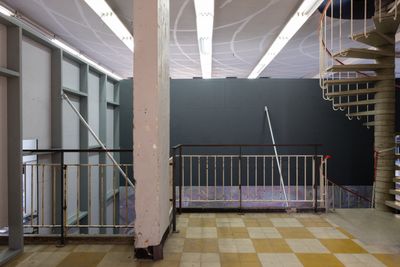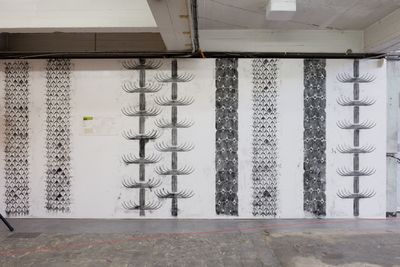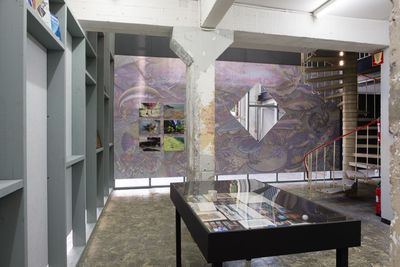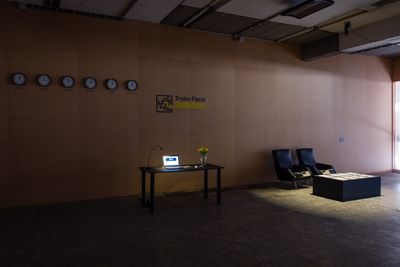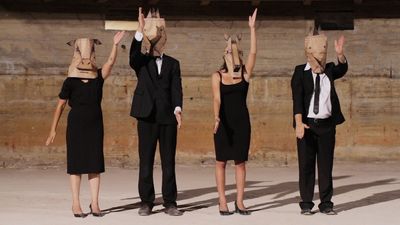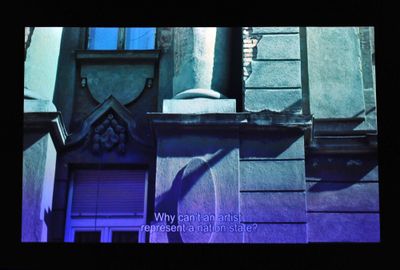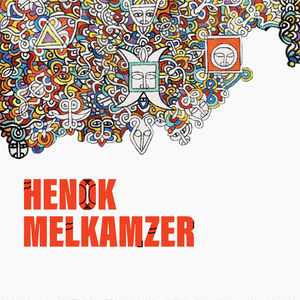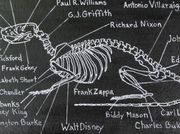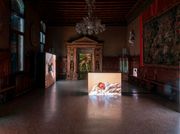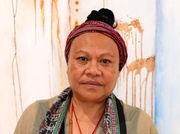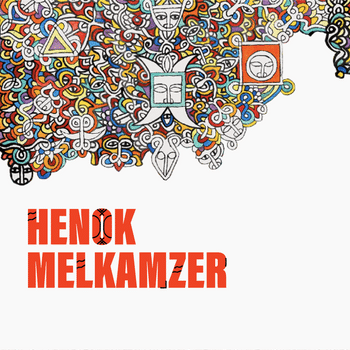Extra States: Nations in Liquidation at Kunsthal Extra City
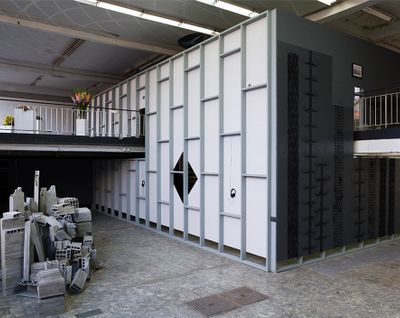
Exhibition view: Extra States: Nations in Liquidation, Kunsthal Extra City, Antwerp (22 September–16 December 2018). Courtesy Kunsthal Extra City. Photo: Tomas Uyttendaele.
The nation-state—a nation (a people) presided over by a governing body with jurisdiction over a defined territory (the state)—is either going through a renaissance or demise, depending on one's perspective. There has been talk about the nation-state's end for years—from a 2013 United States National Intelligence Council report forecasting a potential 'non-state' future world, to the naming of a chapter in H.G. Wells' 1916 book What is Coming? A Forecast of Things After the War, 'Nations in Liquidation'.
But these predictions have been challenged by neo-nationalist resurgences in recent years, particularly in Europe, where the European Union has been rocked by populist calls for harder borders. It is against this backdrop that the exhibition Extra States: Nations in Liquidation, at Antwerp's Kunsthal Extra City, aims to map both the nation-state's becoming and undoing in the 21st century (22 September–16 December 2018). Curated by ILiana Fokianaki, the show includes the work of 13 artists, artist collectives, and duos, and is organised according to two definitions of statecraft that Fokianaki puts forward. The first is the 'exo-state', relating to power exerted through the identification—and/or subjugation—of an outside threat, thus reinstating the need for a boundary to contain the nation. The second is the 'eso-state', whereby power is imposed internally, over the nation itself.
This organising logic between inside and outside is articulated by extra muur (2018), a scenography designed by architect and artist Olivier Goethals consisting of slim, grey walls, some with their skeletal supports on full view, that divide the exhibition into a series of rooms and dark corridors. Walking into the first gallery, one wall acts as the surface on which graphic designer Johan Hjerpe, in collaboration with artist duo Goldin+Senneby, used coal to stencil images of plant specimens found in fossils originating from Carboniferous forests that existed on a plot of land in the former Belgian coal mine area of Zwartberg (part of The Plot, 2017, which also includes a poem by Mustafa Kör). Behind these walls, works aligned with the so-called 'eso-state'—a realm that Fokianaki equates with the clandestine 'deep state', which harbours the 'hushed or top-secret missions of governmental bodies'—are positioned; gesturing towards the idealised façade, or representation, that a nation-state portrays to the outside world, and the internal architectures that support its veneer. (Naturally, Trevor Paglen's Code Names of the Surveillance State, 2015, is located in a shadowy corridor: a video screening some 4,000 code names for surveillance programmes allegedly conducted by American and British intelligence agencies.)
Femke Herregraven's installation Foul Footprints – No.1 Engineering the islands (2018), for instance, makes use of the back-end of Goethal's architectural intervention to present an extensive display of books, magazine clippings, and memorabilia related to the histories of Mauritius and Diego Garcia, which the artist considers examples of extrastatecraft, 'with the ability to operate outside local and international laws.' Diego Garcia is an island in the Indian Ocean that has passed through the colonial hands of the Dutch, French, and the British, who took control of the territory in 1809, eventually turning it into a 'British Independent Overseas Territory' in 1965. That same decade, the UK forcefully evicted the indigenous Chagossian population from the Chagos Islands, thus making way for the Americans, who leased Diego Garcia in 1966 for the purposes of creating a military base, from where bombing missions over Iraq (in 1991 and 2003) and Afghanistan (in 2001), were launched. (In 2016, the island's lease was renewed until 2036, while the Chagossians remain in exile to this day.)
Artefacts in Herregraven's display, shown inside a vitrine, include military badges (there's one created for Operation Iraqi Freedom in 2003), a magazine advert for Lockheed's Indian Ocean Air Shuttle, a US Navy Support Facility mug, and a series of Cable & Wireless international calling cards serving the 'British Indian Ocean Territories'. Alongside these are books including a Mauritius tax guide, and a publication titled Economic Miracle in the Indian Ocean: Can Mauritius Show the Way?, which documents the economic miracle of Mauritius after it gained independence in 1968 and transitioned into an offshore tax haven. (The island featured in both the Panama and Paradise Papers, leaked in 2016 and 2017 respectively.)
A counterpoint to Foul Footprints' snapshot of global capitalism's c/overt machinations, and its associations with historical imperialism, is a mock, open-plan office—consisting of a desk and a waiting room couch and coffee table—installed for the Troika Fiscal Disobedience Consultancy (2016–ongoing). This renegade tax agency, initiated by Núria Güell in collaboration with the Catalan activist Enric Duran, guides European citizens, through a functioning website, to violate the tax rules of their state using, quoting the exhibition text, 'the same strategies that apply within the European single market and are used by business advisors to reduce their tax liabilities'. (All proceeds aid local initiatives focused on the defence of social rights that have been affected by the austerity measures and fiscal policies of the so-called Troika: a body made up of the European Commission, the European Central Bank, and the International Monetary Fund.)
Here, the distinction between a 'nation' and 'state' is perhaps made most clear: by citizens (the nation) collectively pushing back against the state's exertion of control over the people it governs. At the same time, the limits of the state—and the expansive concept of 'the people'—are highlighted by the fact that the agency's website, which essentially enables civil disobedience on a transnational level, is managed by a network of activists hailing from Ireland, Greece, Portugal and Spain: nations of the European Union, whose economies were hardest hit by the Eurozone debt crisis. This of course returns us to this exhibition's title, Extra States: Nations in Liquidation, which seems to call for a new formulation of statecraft altogether—one that takes into account the way the concept of the state, and indeed, the people, has evolved. The Eurozone has seen a greater enmeshment of peoples; a mixing that is likewise reflected in the movement of people worldwide for both geopolitical and economic reasons, not to mention the expansionist conduct of global corporations and national governments. As a result, populations have become increasingly intermixed yet paradoxically divided.
At its core, then, what this exhibition lays out is a conundrum, with two films presented at the end of the show's trail considering art's position in this present stalemate. Screened in a darkened room is Anton Vidokle and Pelin Tan's 2014 film 2084: A science fiction show / Episode 2: The Fall of Artists' Republic (2014), which explores the demise of the so-called Artist Republic through a discussion between a group of artists wearing animal masks who are filmed in discussion inside Oscar Niemeyer's 'International Fair complex' in Tripoli, Lebanon. The group attempts to pick up the pieces of a failed state, but it seems doomed to recreate the same situation that brought about the first collapse. ('After the fall of the Artist's Republic, after the end of history, humans became animals again', one narrator says at the end. 'Did this make them happy? I'm not sure'.) On the other side of a wall in the same room is Sanja Iveković's Why an artist cannot represent a nation-State (2012), the video documentation of a performance whose script was written by philosopher Rada Iveković in response to a request to represent Croatia at the 2012 'Croatie, la voici' festival in France.
Why an artist cannot represent a nation-State cuts from scenes of a city—for example, the shadow of a flag on a brick wall—to Rada Iveković narrating aphorisms on a stage explaining why an artist cannot and should not represent the nation-state, which are then translated into sign language. ('...Because the artist herself is neither representable or definable', is one reason.) Despite this counter-position, however, the work knowingly falls back into an impossible cycle, much like this show—the kind in which one representation negates another in order to keep its power intact, until that representation ends up destroying itself. As Iveković notes during the performance: 'Representation is an eternal puzzle of politics as well as of art. It is in both cases at once impossible yet attempted again and again; impracticable but necessary.' So goes the cycle.
—[O]

